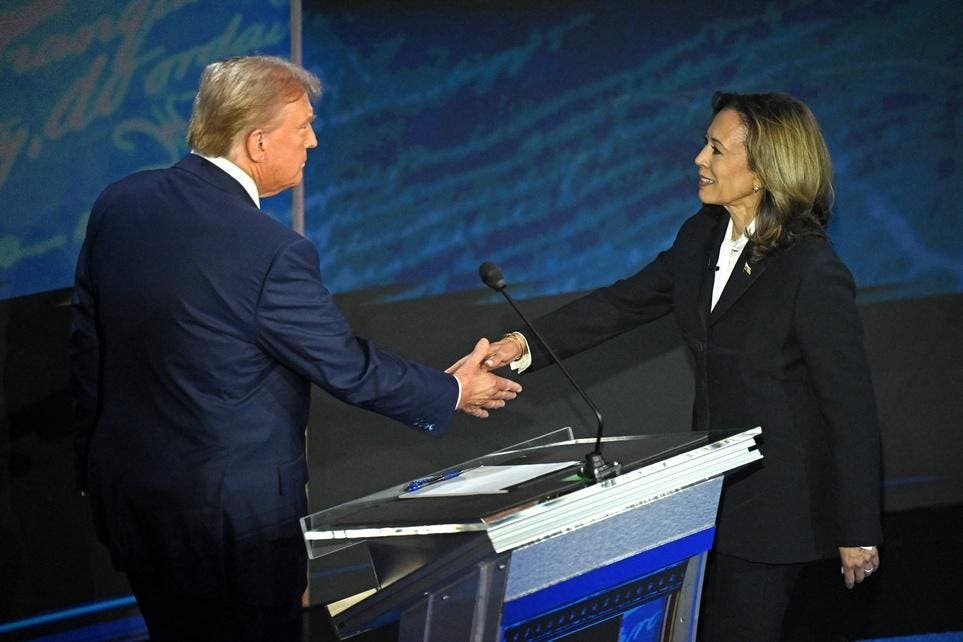TOPSHOT – US Vice President and Democratic presidential candidate Kamala Harris (R) shakes hands … [+]
“We seem to be having an arms race. It’s emblematic of the complete breakdown of any kind of responsibility about the budget.” Cal-Berkeley economist Alan Auerbach said the latter in a recent Wall Street Journal interview.
Auerbach was lamenting what he deems the unhappy fact that presidential candidates Kamala Harris and Donald Trump are persistently one-upping each other on the matter of tax cuts. He considers the tax-cut promises irresponsible. Auerbach is thinking about the national debt. His analysis implies there’s lots of federal debt because of too little federal revenue. More realistically, the debt is a function of too much tax revenue now and the expectation of exponentially more tax revenue in the future. But we’re getting ahead of ourselves.
Before then, it’s useful to think about the offer of tax cuts. Left and right agree with Auerbach that Harris and Trump are irresponsible. Actually, the tax-cut promises are evidence that Trump and Harris are more reasonable than they’re being given credit for.
Members of the left simply disdain tax cuts. Members of the right dislike tax “giveaways” because they believe they get in the way of broad tax reform.
Considering the left first, it will just be said that anything that limits the flow of dollars to Washington is a good thing. Figure that every dollar politicians get their hands on is an extra dollar of control they have over the goods, services and labor that comprise the economy. Which means it can’t be wrong if Trump and Harris are promising ways to limit the inflow.
As for conservatives, they imagine the “giveaways” come at the expense of true tax reform. They don’t understand human nature. Politicians love money as much as private sector workers do. Which means a senseless tax code is the friend of politicians. It paves their future retirement in lobbying gold.
To then presume, as conservatives do, that tax reform will be the reward for holding back on so-called “giveaways” is just naïve. It’s not going to happen. In which case the always and everywhere goal should be to reduce taxes anywhere they can be reduced.
No doubt the ideal of all tax ideals would be a per-head tax that would treat all individuals (rich and poor) as equals. If so, Jeff Bezos would pay the same tax as yours truly only for freedom and economic growth to bloom in a way that would make the present appear Bangladesh by comparison.
It’s just a reminder that the real problem with federal taxation is not that the code is too complicated, or the reverse, that taxes aren’t simple enough. The problem is that whether the code stays as it is now, flat, or “fair tax,” any of them imply that the rich, for being rich, should pay exponentially more in taxes than the rest of us.
That being the case, think once again of all the freedom and growth lost as the most productive hand over so much wealth annually to politicians. Imagine what that unspent wealth could accomplish if left in the private sector. The unseen here is staggering.
Alas, a per person tax isn’t happening. See above. And since neither it nor tax simplification will ever happen, the goal should be to once again cut taxes every which way possible. That’s the responsible thing to do. And if that means rich and poor alike are reporting large and small amounts of income as tips, that too is a laudable outcome.
Bringing it back to Auerbach, whether individual, company or government debt, it’s almost never a consequence of too little revenue, and nearly always a market signal of rising revenue now in concert with the expectation of quite a bit more in the future. Which is just a comment that if government debt is the problem, then the only solution is reduced tax revenue now and in the future, not more. In which case Trump or Harris will hopefully start cutting with abandon come January.







